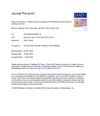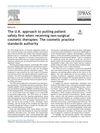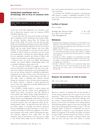 1 citations,
May 2020 in “Journal of The American Academy of Dermatology”
1 citations,
May 2020 in “Journal of The American Academy of Dermatology” The authors agree more research with proper control groups is needed to understand hair loss.
 1 citations,
August 2018 in “bioRxiv (Cold Spring Harbor Laboratory)”
1 citations,
August 2018 in “bioRxiv (Cold Spring Harbor Laboratory)” A new mutation in the TMEM173 gene and a risk allele in IFIH1 cause a unique set of immune-related symptoms.
[object Object]  1 citations,
April 2018 in “Revista da Sociedade Portuguesa de Dermatologia e Venereologia”
1 citations,
April 2018 in “Revista da Sociedade Portuguesa de Dermatologia e Venereologia” Hidradenitis suppurativa is a chronic skin condition more common in women, linked to genetics and lifestyle factors, and associated with various other health issues.
 1 citations,
February 2018 in “Journal of Plastic Reconstructive and Aesthetic Surgery”
1 citations,
February 2018 in “Journal of Plastic Reconstructive and Aesthetic Surgery” The U.K. created the CPSA to set safety standards for non-surgical cosmetic treatments and improve patient protection.
 1 citations,
February 2018 in “British Journal of Dermatology”
1 citations,
February 2018 in “British Journal of Dermatology” The CWARTS tool is a promising method for assessing warts and could improve treatment and research.
 1 citations,
January 2018 in “Indian journal of dermatopathology and diagnostic dermatology”
1 citations,
January 2018 in “Indian journal of dermatopathology and diagnostic dermatology” Trichoscopy helps diagnose and monitor hair and scalp problems without needing many biopsies.
 1 citations,
April 2016 in “Journal of The American Academy of Dermatology”
1 citations,
April 2016 in “Journal of The American Academy of Dermatology” A man developed a rare skin condition and drug-induced lupus, highlighting the need for biopsy in diagnosing skin issues caused by sunlight.
1 citations,
January 2015 in “Acta Dermato Venereologica” Autoimmune myopathy may be linked to hair loss and skin depigmentation.
1 citations,
July 2014 in “The journal of investigative dermatology/Journal of investigative dermatology” Light affects skin health, aging, and cancer risk, and new light-based treatments and imaging are promising for skin care.
1 citations,
January 2009 in “Elsevier eBooks” Laser hair removal can be effective for darker skin but requires careful use to avoid side effects.
1 citations,
June 2003 in “CRC Press eBooks” Stress can worsen some skin diseases like psoriasis and eczema.
 1 citations,
September 2023 in “Rheumatology advances in practice”
1 citations,
September 2023 in “Rheumatology advances in practice” A woman's rare scalp condition worsened after using a specific arthritis medication, suggesting such medications can sometimes trigger or aggravate psoriasis.
 January 2025 in “PLoS ONE”
January 2025 in “PLoS ONE” Aligned membranes improve wound healing by reducing scars and promoting skin regeneration.
 December 2024 in “Archiv Euromedica”
December 2024 in “Archiv Euromedica” Trichoscopy is essential for diagnosing and treating autoimmune cicatricial alopecia early.
November 2024 in “European Journal of Pharmacology” MitoQ may help treat hair loss by boosting hair growth pathways.
 October 2024 in “Archives of Dermatological Research”
October 2024 in “Archives of Dermatological Research” Male and female pattern hair loss have different molecular pathways, suggesting unique treatment targets for each sex.
 July 2024 in “Clinical and Experimental Dermatology”
July 2024 in “Clinical and Experimental Dermatology” Hair loss patterns in Asian and Black women are unique and may affect treatment.
Curcuma aeruginosa Roxb. may help treat hair loss by affecting specific biological pathways.
Whale oil significantly promotes hair growth and may be a safe, effective alternative to minoxidil.

Whale oil may safely and effectively promote hair growth.
 April 2024 in “Skin appendage disorders”
April 2024 in “Skin appendage disorders” Environmental pollutants can damage hair health and cause hair loss.
April 2024 in “Molecules/Molecules online/Molecules annual” Paris polyphylla saponins may effectively treat acne due to their antibacterial and anti-inflammatory properties.
 April 2024 in “Liječnički vjesnik”
April 2024 in “Liječnički vjesnik” Modern treatments can effectively regrow hair and improve life for people with alopecia areata.
 April 2024 in “Journal of cosmetic dermatology”
April 2024 in “Journal of cosmetic dermatology” Minoxidil is less effective on eyebrows and eyelashes than scalp hair because these areas have lower enzyme activity needed to activate the drug.
 April 2024 in “Frontiers in pharmacology”
April 2024 in “Frontiers in pharmacology” Brepocitinib 30mg is most effective for moderate-to-severe alopecia areata, but ritlecitinib 50mg may offer a better balance of safety and effectiveness.
 March 2024 in “Dermatology and therapy (Internet)”
March 2024 in “Dermatology and therapy (Internet)” Genetic factors could lead to personalized treatments for hair loss.
 February 2024 in “Frontiers in physiology”
February 2024 in “Frontiers in physiology” Lymphatic vessels are important for skin repair and could affect skin disease treatments.
February 2024 in “International journal of molecular sciences” Type 3 Innate Lymphoid Cells help maintain skin health and balance, and are involved in skin diseases and healing.
[object Object]  February 2024 in “Skin research and technology”
February 2024 in “Skin research and technology” The research suggests that immune cells and a specific type of cell death called ferroptosis are involved in Frontal fibrosis alopecia.
 January 2024 in “Aging medicine”
January 2024 in “Aging medicine” A COVID-19 infected patient with chronic kidney disease experienced worsened kidney function, hair loss, and unexpected wart clearance.





















